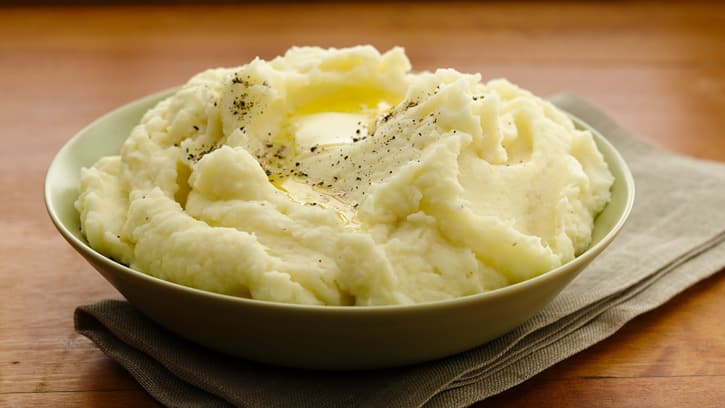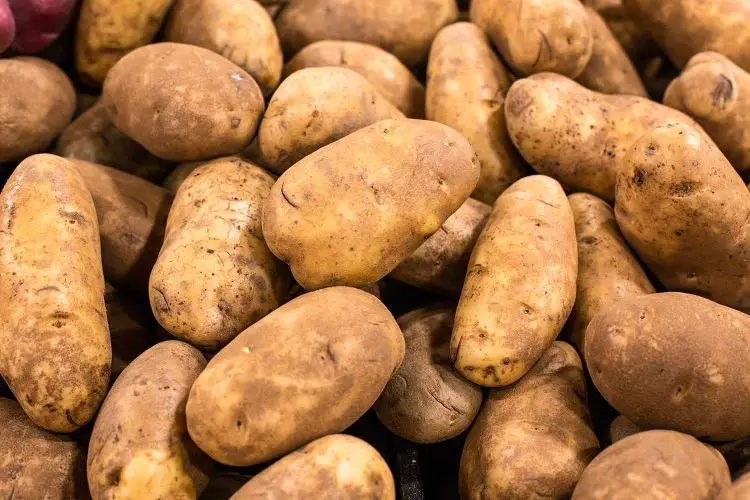Mashed potato is a dish made by mashing boiled or steamed potatoes, usually with added milk, butter, salt, and pepper. It is generally served as a side dish to meat or vegetables.
Roughly mashed potatoes are sometimes called smashed potatoes. Mash can be made with different types of potatoes, including starchy varieties like Russet or Yukon Gold potatoes, or waxy varieties like red potatoes.
But are these potatoes good for diet? or do they make you gain weight?
Keep reading to get your answers about this simple yet delicious dish.
Contents
Is Mashed Potato Good For Diet?
Mashed potatoes can be a healthy part of your diet, as long as you are mindful of the ingredients used to make them.
Plain mashed potatoes made with just potatoes, milk, and butter are a good source of complex carbohydrates, vitamins, and minerals.

However, adding large amounts of cheese or cream can drastically increase the fat content of mashed potatoes and turn them into an unhealthy side dish.
If you are looking for a healthier version, opt for mashed potatoes made with low-fat milk or even yogurt, and use herbs and spices to enhance the flavor instead of adding butter or cheese.
Adding vegetables such as carrots, celery root, parsley or spinach can also give your mashed potatoes a boost of fiber and vitamins. If you are avoiding dairy, try mashed potatoes made with vegetable stock or olive oil instead of milk for a flavorful and nutritious side dish.
With the right ingredients, mashed potatoes can be an easy way to add more nutrition to your meals. Just remember to watch your portion sizes and enjoy mashed potatoes in moderation.
Is Mashed Potato Good for Weight Loss?
Let’s take a closer look at the nutritional value of mashed potatoes and how they can fit into a healthy diet plan.
– The Nutritional Value of Mashed Potatoes
Mashed potatoes are made from boiled potatoes peeled and mashed with butter or milk and other seasonings. While this sounds like a simple dish, there is a wide range of nutritional value depending on the ingredients used in the recipe.
Generally speaking, one cup of mashed potatoes contains approximately 220 calories, 5 grams of protein, 40 grams of carbohydrates, 4 grams of fat, and 3 grams of fiber.
If you are trying to lose weight then eating mashed potatoes should be done in moderation. A single serving should provide enough nutrition without going overboard on calories or carbohydrates so it can definitely be enjoyed as part of a healthy diet plan.
Just remember to watch your portion size and choose more nutritious ingredients when preparing your mash!
What Can I Use in Place of Butter for Mashed Potatoes?
For a healthier version of mashed potatoes, try using olive oil or vegetable stock instead of butter.
Olive oil will give your mashed potatoes a unique flavor while still providing essential nutrients like vitamin E and monounsaturated fats. Vegetable stock is another great option as it adds tons of flavor without adding any fat or calories.
If you are looking to reduce the fat even further, try substituting low-fat cream cheese or Greek yogurt for butter.
Both of these ingredients will add a creamy texture and delicious flavor to your mashed potatoes without all the calories and fat.
So next time you make mashed potatoes, consider using olive oil, vegetable stock, low-fat cream cheese, or Greek yogurt instead of butter to make a healthier version.
How Do You Eat Healthy Potatoes?
Potatoes are a staple in many diets, but they can quickly become unhealthy if prepared incorrectly. To make sure your potatoes are as nutritious as possible, try these tips:
• Choose healthier cooking methods like roasting, steaming, and boiling instead of frying.
• Use non-fat milk or yogurt for creamy mashed potatoes.
• Add seasonal vegetables like diced tomatoes, steamed broccoli, or sautéed peppers to your roasted potatoes for extra nutrition.
• Look for healthy toppings such as garlic and herbs, salsa, or greek yogurt instead of butter or sour cream.
• Experiment with spices like cumin, paprika, and chili powder for added flavor.
By following these tips, you can enjoy potatoes as a healthy part of your diet without sacrificing flavor or nutrition.
Is Mashed Potato Good for Diet?
Yes, mashed potatoes can be part of a healthy diet when eaten in moderation. The key is to choose healthier ingredients when making your mash and watch portion sizes.
If you use low-fat milk or yogurt, olive oil instead of butter, and nutritious toppings like garlic and herbs or salsa, then mashed potatoes can definitely fit into a healthy eating plan.
Just remember to watch your portion sizes and enjoy mashed potatoes in moderation.
In What Ways Mashed Potatoes Are Unhealthy?
Mashed potatoes can become unhealthy when prepared with too much fat and salt. Using ingredients like full-fat milk, cream, or butter to make mashed potatoes can quickly increase the calorie and fat content of this dish.
Additionally, adding too much salt or using high-sodium seasonings can push up the sodium levels in your mash.
To make sure your mashed potatoes stay healthy, use low-fat dairy products, olive oil instead of butter, and seasonings with less salt.
These simple swaps can make a big difference in the nutrition profile of your dish.
Do Mashed Potatoes Make You Gain Weight?
The answer is not as simple as you might think. Mashed potatoes themselves are not particularly high in calories, and they can even be part of a healthy diet.
However, it is important to consider how they are prepared. For example, adding lots of butter or cream will increase the calorie content significantly.
Additionally, many people tend to eat larger portions of mashed potatoes than other foods.
So, if you are trying to lose weight, it is important to be mindful of your portion sizes. Enjoying mashed potatoes in moderation is perfectly fine, but loading up on them at every meal is likely to lead to weight gain.
Why Mashed Potatoes Are Healthy?
Let’s take a look at some of the benefits of eating mashed potatoes.
1. Dietary Fiber Content
One of the biggest benefits of mashed potatoes is their high dietary fiber content.
Dietary fiber helps to keep your digestive system running smoothly, which can reduce the risk of constipation and other digestive issues.
Additionally, dietary fiber helps to keep your cholesterol levels in check, which can help reduce your risk of heart disease and stroke.
2. Vitamins & Minerals
Mashed potatoes are also an excellent source of vitamins and minerals, including Vitamin C, phosphorus, magnesium, iron, zinc, and potassium. Vitamin C is important for immune health and wound healing, while phosphorus helps to maintain strong bones and teeth.
Magnesium helps to regulate blood pressure levels, while iron aids in red blood cell production and oxygen delivery throughout your body. Zinc helps to support cell growth and repair, while potassium helps to regulate nerve function and muscle contractions.
All of these nutrients work together to keep your body functioning optimally!
3. Low-Calorie Content
Finally, mashed potatoes have a surprisingly low-calorie content when compared to other starchy foods like pasta or rice. A single serving has only around 280 calories – far less than other starches!
This makes mashed potatoes an excellent choice for those looking to lose weight or maintain their current weight without sacrificing flavor or satisfaction.
Do You Have to Use Butter in Instant Mashed Potatoes?
No, you do not have to use butter when making instant mashed potatoes. There are many healthier alternatives that can be used instead.
For example, olive oil or coconut oil make excellent substitutes for butter in any recipe.
Additionally, you can add yogurt or low-fat milk to give your mash a creamier texture and flavor without adding too many calories or saturated fat.
Ultimately, the type of oil or dairy product you use is completely up to your personal preference!
What Does Butter Do to Mashed Potatoes?
Butter adds a rich, creamy flavor to mashed potatoes and helps to create a smooth texture.
Additionally, it can also help to bind other ingredients together, making sure that all the flavors are balanced. It is important to note that using too much butter can quickly increase the calorie and fat content of your dish.
As such, it’s best to use butter sparingly and to opt for healthier alternatives when possible.
Ultimately, mashed potatoes can be a part of a healthy diet as long as they are prepared with healthier ingredients like olive oil or coconut oil and seasoned with less salt.
Additionally, it is important to watch your portion sizes and enjoy them in moderation. With these simple swaps, mashed potatoes can be enjoyed as part of a nutritious and balanced diet!
Which Is the Healthiest Way to Eat Potatoes?
The healthiest way to eat potatoes is by baking, boiling, or steaming them. Avoid deep-frying or adding too much salt and butter as these can add unnecessary calories and fat.
When possible, opt for sweet potatoes over white potatoes as they are slightly more nutritious and have a lower glycemic index than other varieties of potatoes.
Additionally, be sure to eat the skin of potatoes as they are packed with fiber and minerals. With these tips in mind, potatoes can be part of a balanced diet!
What Is the Best Way to Eat Potatoes?
Here are some best ways in which you can enjoy your potatoes:
1. Cooking Methods
There are many different ways to cook potatoes, but some methods will bring out their flavor more than others. Boiling potatoes is one of the most popular ways to prepare them, as it results in a soft and fluffy texture.
Baking or roasting potatoes brings out their natural sweetness while frying them creates a crispy exterior that can be used as the perfect addition to any meal.
2. Seasonings
Adding seasonings to your potatoes can help enhance their flavor and add an extra layer of complexity.
For example, garlic and herbs such as rosemary or thyme work well with boiled potatoes, while smoked paprika and chili powder bring out the sweetness in baked or roasted potatoes.
Add salt and pepper for a simple but classic flavor combination that goes well with all types of potato dishes.
3. Health Benefits
Potatoes are an excellent source of vitamin C, which helps boost your immune system and protect against illness. They’re also high in potassium, which can help lower blood pressure levels and reduce stress on your heart.
And because they’re rich in fiber, they can help keep you feeling full longer so you don’t snack between meals.
No matter how you choose to eat your potatoes—boiled, baked, or fried—there are plenty of ways to make them delicious and nutritious!
Which Is Healthier Boiled or Baked Potatoes?
When it comes to choosing between boiled and baked potatoes, both options are relatively healthy. Baked potatoes tend to be higher in fiber, while boiled potatoes typically have slightly more vitamins and minerals.
However, both types of potatoes can provide important nutrients when enjoyed as part of a balanced diet.
Baked potatoes are the healthier choice because they are generally lower in calories and contain more fiber, which can help you feel fuller for longer.
Additionally, baked potatoes can also be topped with healthy ingredients like olive oil and vegetables to increase their nutritional value.
Boiled potatoes have slightly more vitamins and minerals than their baked counterparts, but they still offer important nutrients like potassium and vitamin C.
Boiling potatoes is also an easy and quick way to prepare them, making it a great choice when you’re short on time.
Are Potatoes Good for Weight Loss?
Potatoes can be a healthy part of any weight loss plan as long as they are prepared in a healthy manner.
Baked potatoes are packed with vitamins and minerals, while boiled potatoes have slightly more.
Additionally, potatoes can make you feel full for longer and can help satisfy cravings without adding unnecessary calories.
However, it is important to note that potatoes can be high in fat and calories if they are deep-fried or loaded with butter, cheese, or other unhealthy ingredients.
When trying to lose weight, it is best to avoid these types of preparations and opt for healthier cooking methods such as baking, boiling, or steaming your potatoes.
Which Type of Potato Is the Healthiest?
When it comes to choosing a type of potato, there is no one “healthiest” option.
All varieties of potatoes are packed with important nutrients like potassium and vitamin C, so they can all be included in a healthy diet.
Some may contain more fiber or vitamins than others, but overall each variety offers its own unique nutrition profile.
Russet potatoes are a particularly good choice due to their high fiber content and low glycemic index, which can help keep blood sugar levels stable.

Sweet potatoes are also an excellent source of vitamin A and contain more antioxidants than regular potatoes, making them another healthy option.
What Potato Does Not Raise Blood Sugar?
Potatoes typically have a high glycemic index, which can cause your blood sugar levels to spike. However, some varieties are lower on the GI scale than others and are considered “slow-release” carbs.
Russet potatoes, for example, have a low glycemic index and release their sugars slowly into the bloodstream.
Sweet potatoes are also a good choice for those looking to regulate their blood sugar levels, as they have a lower GI than regular potatoes and contain more antioxidants.
Overall, potatoes can be an important part of any healthy diet, so long as they are cooked in a healthy manner without added fats or sugars.
And no matter which type you choose, you can be sure you’re getting plenty of important vitamins and minerals.
Is Sweet Potato Healthier Than Potato?
Sweet potatoes are often touted as being a healthier alternative to regular potatoes due to their higher concentrations of vitamins and antioxidants. They are also lower in calories, fat, and carbohydrates than regular potatoes and contain more fiber.
Overall, sweet potatoes can be a healthy part of any diet when enjoyed in moderation. However, regular potatoes should not be completely eliminated, as they also contain important nutrients like potassium and vitamin C.
The best way to enjoy potatoes is to prepare them in a healthy manner, such as baking or boiling, without adding extra fats or sugars. This will ensure that you get the most nutrition out of these delicious starchy vegetables.
No matter which type you choose, potatoes can be part of a balanced diet as long as they are prepared in a healthy way.
Conclusion:
Mashed potatoes can be an excellent addition to any meal when prepared properly with healthier ingredients such as low-fat milk or cream instead of whole milk or butter.
The starchy goodness provides essential vitamins, minerals, protein, and fiber which can help contribute to overall health while not overloading on unnecessary calories.
So if you’re looking for a tasty side dish that won’t break the scale next time weigh-in day rolls around consider giving mashed potato a try!
Mashed potatoes are an incredibly versatile side dish that can be enjoyed by everyone – even those on restrictive diets!
Not only are they delicious and satisfying but they’re also packed with essential vitamins and minerals that can help keep your body healthy and functioning optimally.
Thanks for reading!
Amazon and the Amazon logo are trademarks of Amazon.com, Inc, or its affiliates.

